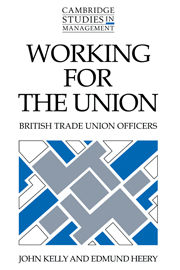Book contents
- Frontmatter
- Contents
- List of figures and tables
- Preface
- List of abbreviations
- Part 1 Introduction
- 1 Introduction: trade unions and industrial relations
- 2 Theoretical analyses and empirical studies of trade union officers
- Part 2 The parameters of union work
- Part 3 The full-time officer at work
- Part 4 Conclusions
- Appendix: Research methods
- Notes
- Bibliography
- Index of names
- Index of subjects
- Cambridge Studies in Management
1 - Introduction: trade unions and industrial relations
Published online by Cambridge University Press: 22 October 2009
- Frontmatter
- Contents
- List of figures and tables
- Preface
- List of abbreviations
- Part 1 Introduction
- 1 Introduction: trade unions and industrial relations
- 2 Theoretical analyses and empirical studies of trade union officers
- Part 2 The parameters of union work
- Part 3 The full-time officer at work
- Part 4 Conclusions
- Appendix: Research methods
- Notes
- Bibliography
- Index of names
- Index of subjects
- Cambridge Studies in Management
Summary
One of the major resources of any trade union movement is the cadre of full-time officers employed to service its membership. British trade unions currrently employ about 3000 full-time officers (FTOs) to represent the interests of members both collectively, through negotiations and consultation, and individually, through procedures and at tribunals. Full-time officers can play a key role in shaping the responses of union members to management initiatives; they can have an impact on workplace union organization; and they have often been seen as key recruiting agents for unions in unorganized companies. The salary costs of the officer workforce now make up the single largest item of total union expenditure. Yet despite their importance little is known about union full-time officers, and in the past 30 years they have been the subject of only three major studies: Trade Union Officers (Clegg, Killick and Adams, 1961); Workplace and Union (Boraston, Clegg and Rimmer, 1975); and Managers of Discontent (Watson, 1988). Industrial relations research in this period concentrated on a variety of other actors: shop stewards in the 1960s and 1970s, government incomes and legal policies from the early 1970s, and employers from the 1980s. The present study aims to fill this serious gap in our knowledge by presenting a wide range of data on the numbers, organization, activities and values of full-time union officers. To this end we used a variety of research methods – interviews, questionnaires and non-participant observation – in a cross-section of unions and employment sectors.
Our second aim was to contribute to theoretical debates about union organization in which the concept of ‘bureaucracy’ has played a prominent role.
- Type
- Chapter
- Information
- Working for the UnionBritish Trade Union Officers, pp. 3 - 7Publisher: Cambridge University PressPrint publication year: 1994



